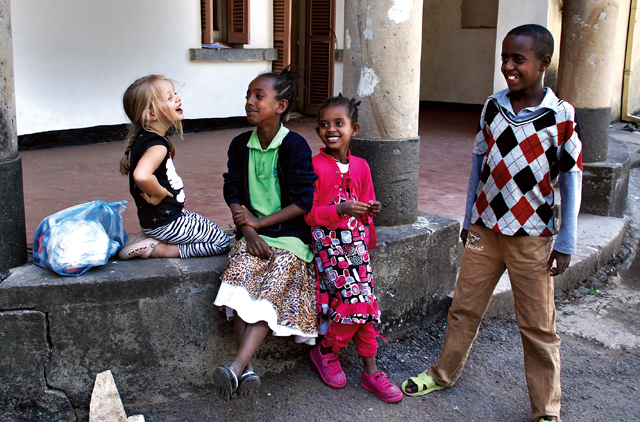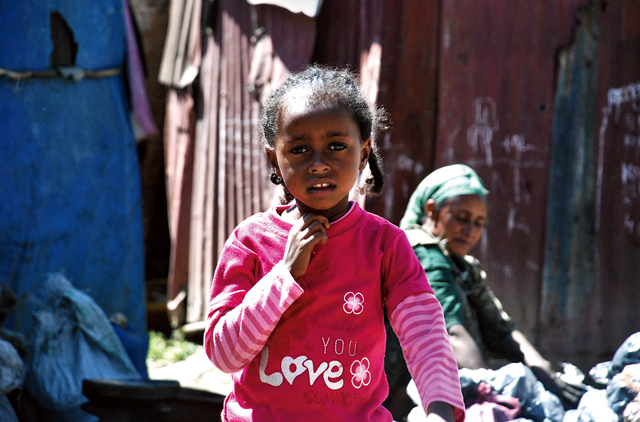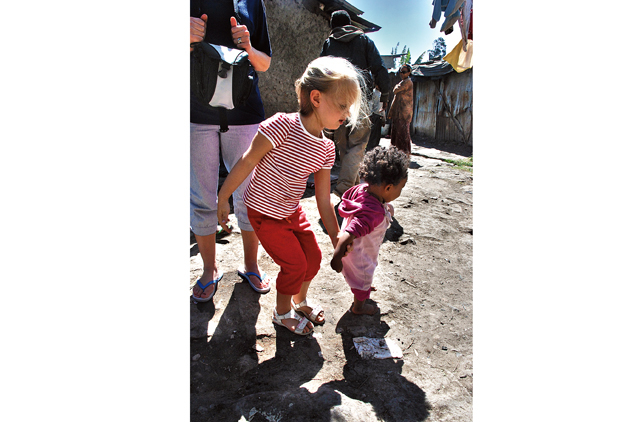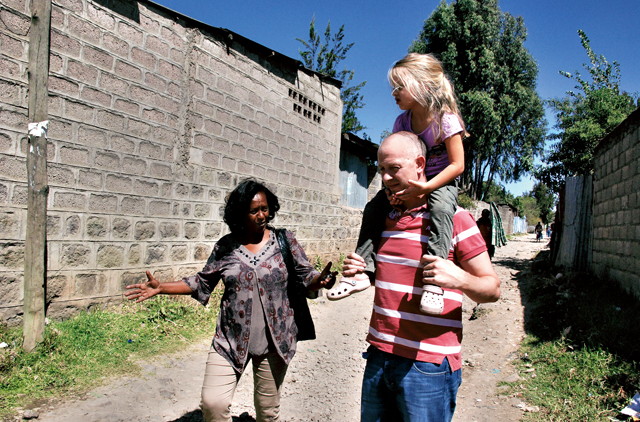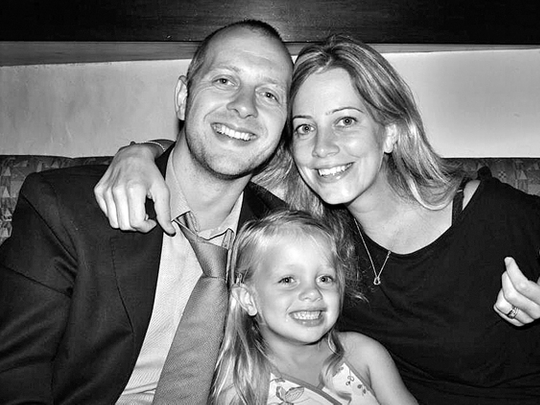
Atsede Seyoum could barely speak. Sobbing and hugging her older brother Kasahun and little sister Genet, she was recalling the extremely disturbing time when she and her siblings were orphaned after their parents died of Aids. “There was no one to take care of us,’’ the 16-year-old wept. With no extended family to rely on for support, they were forced to fend for themselves. “We had to literally beg on the streets,’’ she said. “Several days we went hungry.’’ Then, of course, there were other dangers of a girl living alone on the streets of Ethiopia that she had to face.
Destitute, hungry and without proper clothes or shoes, the siblings had to earn a living any which way they could. “It was such a harrowing tale,’’ recalls James Drinkwater, creative director of the Dubai-based Legatum Group, a private investment company. He met the orphans on the outskirts of Ethiopia’s capital Addis Ababa, as part of a visit organised by the Legatum Foundation, the humanitarian arm of the company he works for. The meeting had completed a charity programme there that included the rehabilitation of almost one million people.
Seated on the floor of their small and dimly lit thatched hut, James, 33, was so moved by the girl’s heart-rending story he realised he had to do something to make a difference. “It echoed the abject poverty that was widespread in the country,’’
he says. Fortunately, Atsede, her 14-year-old sister Genet and her brother Kasahun, 18, were spotted by volunteers of a charity called Save Lives, which was being part-funded by the Legatum Foundation. They took the siblings into their care and helped to rebuild and improve the orphans’ lives.
Based in Addis Ababa, the organisation works tirelessly to help the needy and neglected in Ethiopia. It aims to bring about change through community education programmes by creating self-help groups, setting up activity centres, providing library facilities and running interactive training programmes at school or community centres teaching large numbers of people about HIV and Aids awareness, and offering vocational training.
“At such a young age the orphans’ lives would have been over had they not been rescued by Save Lives,’’ says James. “This family now has a home – even if it’s only a hut – and Atsede is in school, studying for her A-Levels. She hopes, one day, to qualify as an accountant. Her brother is an IT student and her sister is entering her GCSE year.
“That was the moment – seated in her hut and listening to Atsede’s story – when I decided I needed to do something for the organisation which was doing such amazing work for the children who were suffering. The siblings now have a chance at life, yet they are just three among millions of other orphans who remain in great need.’’
The quest to save lives
Ethiopia is trying to tackle its social and economic problems. But there are millions of orphans (around four million according to Unicef), many of them a result of the HIV and Aids crisis that has beset the region for decades. “They are in desperate need of help right now: they need housing, clothes, food, health care, schooling, and above all, love,” says James.
After the emotional impact of his trip in 2010, James decided to apply his skills towards getting the voice of Save Lives heard across the world. To this end, he contacted Frehiwot Alebachew, the project director of the charity. With more than 25 years experience in development activities at local community level, she is supported by over 40 professional staff and 250 trained community volunteers.
“I work in branding and communications and it was clear that this is an area where I could put some of my skills to immediate use in helping them get their voice heard outside of Addis Ababa,’’ James explains. One of the first things he did was to raise awareness about the charity. “They had no communication facilities or any form of exposure, so I decided to create a brand image for Save Lives to help build their brand presence.’’
He designed a logo and printed flyers and brochures for the charity using his own funds. He distributed them to corporates, as well as friends and family. He also built a website for the charity, which he currently manages, and he deals with the upkeep of their facebook and twitter accounts.
Determined to do something more for Save Lives, and in the process help improve the condition of orphan and destitute children, James returned to Ethiopia with his 33-year-old wife Jodie and their four-year-old daughter, Layla, last December. But this time James documented his trip on video. Layla featured in the film, which tells a story about the Save Lives Child Care programme from her perspective.
“Until we took her to Ethiopia, Layla was unaware of the concept of an ‘orphan’,’’ says James. “She could not understand how children could live without their parents. But there, surprisingly, she took it all in very well. What was also amazing was that she bonded so well with the children there. Within 30 minutes of meeting the orphans, Atsede, Genet and Kasahun, they were all playing and running around with each other.”
James took her around to all the camps and centres being run by Save Lives. He also took her along to the huts where orphan Ethiopian children were living with caretakers. “We were there for close to a month, witnessing the condition of the people there and wondering how we could help them,’’ he says. “Layla still fondly recalls the moments she spent with Ethiopian children. Although she is just four, she often talks about helping the children by getting them toys, books and little gifts.”
With hindsight, James agrees that taking Layla along was a definitely a good thing. “The Ethiopian children could relate and easily bond with her, and they also opened up much more while with her,” he says. The video that James created was posted on YouTube in April this year and has chalked up more than 450 views. Several people who viewed the video have contacted Save Lives, offering to volunteer and donate money to help the children. “On her way back, Layla said that she found the trip very interesting. She often talks about helping them out and getting them recognition in the world.
We plan to go every year to catch up and record the progress of our Ethiopian friends. We have become particularly close to seven children – Esyas Adugna, 16, Taye Adugna 13, Meseret Adugna 12, and Welabo Adugna, 6, and, of course, the three orphans we met on our first visit to Save Lives. Welabo has become Layla’s best friend. She makes it a point to ask us to send her little gifts including toys, foodstuff, and painting books regularly. They also keep in touch with each other over the telephone. We have all remained connected with the children ever since,’’ says James.
He is glad he took his daughter to Ethiopia to show her another aspect of the world. “So many of us lead a privileged existence here in the UAE, and taking Layla to Ethiopia is one way of impressing upon her the many inequalities that exist in the world,” he says. “But it’s also a way for me to begin teaching her the importance of living a life of purpose and meaning. I hope that involving my daughter in this experience will instil in her a sense of purpose to live her life to the full from an early age.’’
Charity begins at home
His wife Jodie is also supporting and promoting Save Lives through the school where she teaches, Kings’ Dubai. Recently, the school collected around Dh40,000 for Save Lives through several fund-raisers that she helped organise. Apart from raising awareness about the charity, James has also been raising funds for the Save Lives child care programme. Money is directed towards helping women, children and local youth groups by focusing on three areas.
HIV and Aids prevention and control, community care and support services, and capacity building are all taken care of by the programme. His efforts have already begun bearing fruit. The online campaign he set up last year to raise money for the seven children called Seven Lives, managed to raise more than Dh84,450. “Save Lives has touched the lives of more than 123,000 people over the last three years,” says James, who is overwhelmed by the positive feedback from friends, family and colleagues.
Adopting Ethiopian orphans is a popular cause at the moment, and it receives great media coverage. “The first time I left Addis, I was shocked at the number of orphans that were being taken out on the plane. But as kind-hearted as these efforts are, the issues are not going to be solved by removing the future lifeblood of the country. There are many challenges, but ultimately we must encourage these children to be loved, nurtured and raised in family environments at home.
It’s an achievable goal.” James plans to show people the importance of love and family in any child’s development through the interactive website he is building for Save Lives. “It is still a work in progress,” he says. “What this has taught me is achievement in life is not about comparing the size of your car or the funds in your bank. If you wish to grow as a person, then you must give. And it’s not just about money – you can give time, skills, or experiences. And you can start now!”
Tell us the story… Do you know of an individual, a group of people, a company or an organisation that is striving to make this world a better place? Email us at friday@gulfnews.com or the features editor at araj@gulfnews.com


